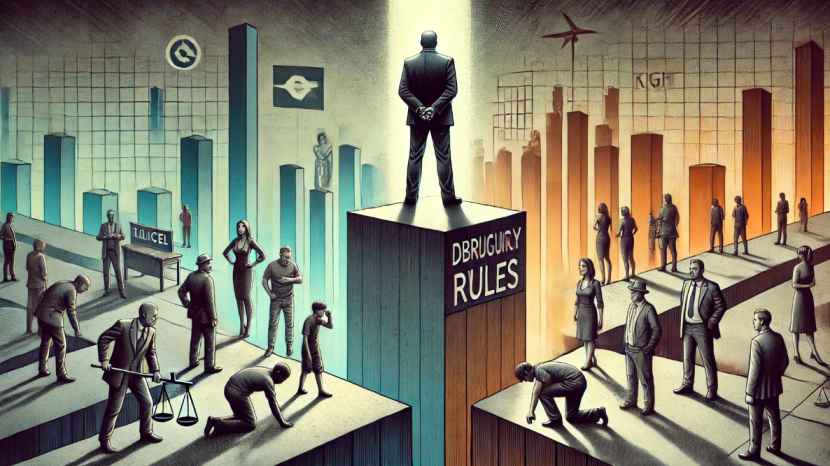A nation’s financial health depends on adaptable policies that foster sustainable development. However, ambitious reforms aimed at prodigious economic growth are often stigmatized, facing resistance from those unwilling to embrace change. While traditionalists fear instability, clinging to outdated regulations can hinder progress. To move forward, obsolete policies must be abrogated, ensuring governance aligns with modern economic demands.
At the same time, a strictly insular approach—one that disregards global economic trends—can be detrimental. No economy thrives in isolation, and an informed strategy must consider international market dynamics. The fair dispensation of resources is crucial to reducing inequality, preventing financial monopolies, and ensuring balanced economic participation.
In many cases, de facto financial systems, though unofficial, operate as lifelines for certain industries and communities. While formal policies shape economies, discretionary decision-making by policymakers plays an essential role in addressing unforeseen economic challenges. However, being aloof to market realities and public concerns can lead to distrust and economic stagnation. A strong and adaptable economy requires both structure and flexibility, ensuring long-term stability while embracing necessary reforms.
(1) Prodigious
- Meaning: Extremely large in size, amount, or degree; remarkable or impressive in an extraordinary way.
- Context (from the passage): The passage refers to “prodigious economic growth,” meaning an exceptionally large and impressive level of financial progress, far beyond the ordinary.
- Example Sentence: The scientist’s prodigious intelligence allowed her to make groundbreaking discoveries in a short period.
(2) Stigmatized
- Meaning: To label or treat someone or something as socially unacceptable or disgraceful.
- Context (from the passage): The phrase “stigmatized for seeking global opportunities” means that people who look for work or prospects outside their country are unfairly criticized or viewed negatively.
- Example Sentence: In the past, people suffering from mental health issues were often stigmatized instead of receiving proper support.
(3) Clinging
- Meaning: Holding on tightly to something, either physically or emotionally, and being unwilling to let go.
- Context (from the passage): The phrase “clinging to an insular mindset” means that people are unwilling to let go of their narrow or isolated way of thinking, resisting new or broader perspectives.
- Example Sentence: Even after moving to a new country, he kept clinging to his old traditions and customs.
(4) Abrogated
- Meaning: Officially ended, repealed, or abolished (especially a law, agreement, or policy).
- Context (from the passage): The phrase “strict policies that were once enforced have now been abrogated” means that rules or laws that were previously in place have been officially removed or canceled.
- Example Sentence: The outdated law was finally abrogated, allowing businesses to operate with fewer restrictions.
(5) Insular
- Meaning: Narrow-minded or isolated, often due to a lack of exposure to different ideas, cultures, or perspectives.
- Context (from the passage): The phrase “an insular mindset that resists change” suggests a way of thinking that is closed off or resistant to new ideas, making progress difficult.
- Example Sentence: His insular attitude prevented him from understanding the benefits of globalization.
(6) Dispensation
- Meaning: A special allowance, exemption, or system of order, especially one that provides relief from usual rules or obligations.
- Context (from the passage): The phrase “a dispensation that prioritizes economic growth” refers to a system or policy framework that grants special considerations or relaxes rules to focus on economic development.
- Example Sentence: The government granted a dispensation to small businesses, allowing them to delay tax payments during the economic crisis.
(7) De Facto
- Meaning: A Latin term meaning “in fact” or “in reality,” used to describe something that exists in practice, even if it is not officially established by law.
- Context (from the passage): The phrase “a de facto reality of modern economies” suggests that, in practice, economies function in a certain way, even if official policies or regulations say otherwise.
- Example Sentence: Although the country has a president, the military leader is the de facto ruler, holding real power behind the scenes.
—————
While “in reality” and “de facto” have similar meanings, there are a few key reasons why people prefer “de facto” in certain contexts:
Precision in Legal and Political Contexts
“De facto” is often used in legal, political, and governmental discussions to contrast with “de jure” (meaning “by law”).
Example:
“The country has a de jure president, but a de facto ruler (who actually holds power).”
This distinction clarifies that while someone may officially hold a title, another person actually wields authority.
Stronger Emphasis on Practicality Over Theory
“De facto” suggests that something is functionally true, regardless of whether it’s officially recognized.
Example:
“English is the de facto global language of business.”
This implies that English functions as the global business language even if no official law states this.
Conclusion
While you can use “in reality” in everyday speech, “de facto” carries a more precise and formal tone, making it ideal for legal, political, economic, and academic writing.
(8) Discretionary
- Meaning: Something that is optional or based on personal judgment rather than being fixed by rules or laws. It refers to choices made by an individual or authority using their own discretion.
- Contextual Explanation (from the passage): In the passage, “discretionary power” refers to authority that is not bound by strict rules but instead allows officials to make decisions based on their judgment. This means they have the flexibility to act as they see fit.
- Example Sentence: The manager has discretionary authority to approve leave requests based on workload and team availability.
(9) Aloof
- Meaning: Someone who is emotionally distant, detached, or uninvolved, often appearing indifferent or uninterested in social interactions.
- Contextual Explanation (from the passage): In the passage, “aloof leaders” refers to those in power who remain distant from the concerns of the people, showing little involvement or empathy in addressing their struggles.
- Example Sentence: Despite being in the same room, he remained aloof, avoiding any conversation with his colleagues.



